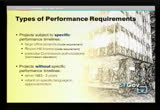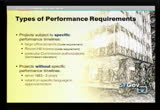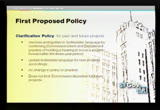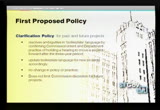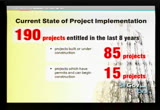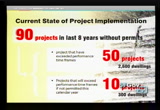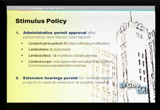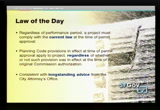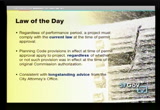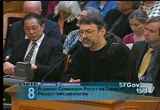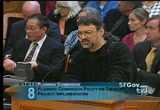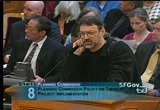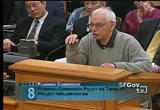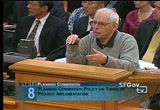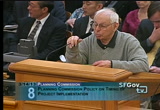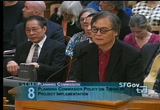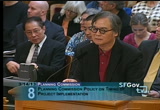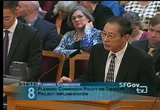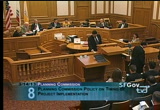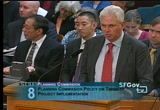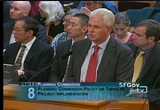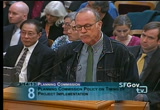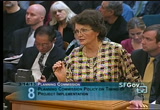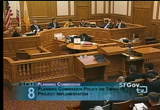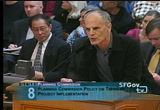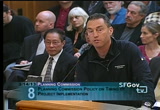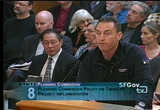tv [untitled] March 17, 2013 12:30am-1:00am PDT
12:30 am
the first is for those projects that are subject to code mandated or commission mandated time frames. examples of these include large office projects or reconhill project and also include projects where their specific proposal or scope or uniqueness feel that a time is more appropriate, a project wheb i believe you approved in september. now, the second type of performance conditions generally on the lower half of your screen. this is essentially everything else. projects where the code does not prescribe a particular timeframe and where you commissioners don't call out theic particular needs or wants and the project be implemented in a reasonable
12:31 am
timeframe n 1983, 3 years was a reasonable timeframe. that's what we use today. the next question is how come we implement these performance and conditions that you impose on conditions of approval. if we are dealing with the categories subject to code requirements and specific time frames. we do follow the instructions in the approval document, generally very straight forwards, nothing out of the ordinary. the second category of performance conditions similarly while they are governed by the approval document, the board of that language that under pins that document while it remains perfect. specifically there is a bit of internal contradiction of these approvals. on the one hand they indicate that an
12:32 am
authorization becomes invalid merely through the passage of time. on the other hand, this language also suggest that an authorize remains valid until you revoke it at a public hearing. so commissioners what eve done in these cases historically is to adopt a very conservative stance and following it's performing time period to extend the original authorizations. this brings us to the first of two policies. we suggesting that you adopt a resolution on april 4 that will deal with both future projects to get rid of this conflict, this ambiguity. if a former time period has run that you establish a permit to be
12:33 am
brought back to you for permission. there was a clerical error on your draft policy. we are going to remedy that to make what i say perfectly clear and reflective in that resolution. very importantly what i just mentioned is not a change to policy, it's not a change to our practice, it's merely rearticulating what we are doing now so there is more certainty and clairity of process. also this does not limit your discretion. as today should you review a project that you feel -- you can impose a specific timeframe. so, to be clear, the policy would apply on the in the absence of the specific direction from you. now, before we discuss the second policy, it's helpful to look at some framing statistics. before i put this on the screen i want to stress
12:34 am
that these are as accurately as we can make them but very generalized. in the last 8 years you approved about 190 physical developments that are not mandated for conditions of approval. why did we choose 8 years? because it was earlier than 2005 which were the first of the 3 year performance period was touched by the recession. we are targeting recession impacted projects only. out of these projects, 85 are now under construction or complete. an additional 15 have permits to begin construction. lastly we are looking at 90 projects that do not have permits. so out of 190 projects
12:35 am
approved over the last 8 years do not have permits and cannot begin construction. let's break it down more. of these 90, 50 which include about 2600 dwelling units and 15 significant commercial projects these have already succeeded their performance time frames. these will be returned to you for approval before their built. you can see these time frames, they will do so this year unless the permit is pulled in a couple months. these include 300 dwelling units and 5 non-residential significant projects. if we are looking at 50 or 60 projects what has the commission done historically with respect to
12:36 am
request for extensions. we have seen very few over the last 5 years. again, we've had 35 request and we've had 34 approvals. only one has been disapproved. it's worth note ing that disapproval was for senior citizens prior for the consideration. in that case the developer had not secured the subsidies and did not have a development partner and had not maintains the property in clean condition. so these numbers tell us two important things: the first is that despite already having been publically vetd and approved by staff and approved by you, more than a quarter of these recession impacted projects will need
12:37 am
another hearing and that hearing has at 97 percent outcomes. based on the number and context, we question the utility of that hearing. here is what we are recommending that you consider as your second policy. we are proposing a one time limit economic stimulus policy. this would responsibility to the impact to the recession, it would respond to the amount and quality development publically reviewed in the process. in general the policy would allow building and permit issuance after the timeframe has lapsed. it's important to note that this is not open-ended. we are proposing the department send out a 60 day mail notice to land owners of this project and
12:38 am
allow enrollment to the program only if responders apply to us within that 60 days. and oncen rolled, they will have an 18 month timeframe to obtain the required permits. the policy would not apply to projects with commission mandated or code mandated time frames. finally the policy wouldn't close the door for projects that choose not to opt in. they would further request a hearing of you today. we do need to talk about what is the law of the day. this is something that would be articulated in the stimulus possess in the clarification policy that we talked b the principles of the law of the
12:39 am
day that a building application must conform to the law of the time of the approval. this is applying regardless of any provisions or what proifthsz provision were or were not in effect. what this means to take for example a project that hypotheticallily received your conditional use for the plan process but that didn't secure a building permit until after the plan's effective date, that building permit will be nonetheless be subject to all current provisions of that plan which can be parking control, use control. it does reflect long stand is advice from the
12:40 am
city attorneys office and will apply going forward regardless of either of these two policies. here is our last slide commissioners and before you continue your discussion today we want to remind you on the mechanics of the policies of a single majority of commissioners is required in order to adopt the policies. policies can be modified or revoked at any time and perhaps the most importantly, this is the only stop, this does not require approval by the board of supervisors or any other entity. last thing, to reiterate this is only for discussion. we are not proposing any action. this will be back on your calendar on the 4th of april. happy to respond to any questions. >> thank you. two speaker cards up for comment. excuse me, eric brooks and bernie choeden.
12:41 am
>> good afternoon, commissioners, eric brooks representing the organization in our city. first, i would strongly urge you to postpone consideration of this item passed april 4th specifically for the reason this legislation also addresses hills and if there is an appeal over a project that the zoning administrator and these new rules can allow for the window of time that appeal delays the project under be added as another extension. now, whether that may or may not be reasonable, it could be reasonable, the point is that we are about to have a major consideration of changes in our
12:42 am
ordinance around sequel procedures in san francisco, both the wiener version and now the kim version of these changes and i don't think that the planning should be arbitrarily setting policies typically where they r elt to sequel and probably make some profound changes to the sequel and i would urge you wait until those two pieces of legislation is decided and then take up this item. to this item itself, i just want to say that especially to the second resolution, just quite frankly no way. we don't want six year instead of 3 years. we don't want the zoning administrator with all due respect to the zoning administrator, who i'm sure does a great job, we don't
12:43 am
want the zoning administrator to extend deadlines add nauseam. we are talking about 50 projects that could use this rule making to sneak under the radar. this is the kind of thing that makes us so concerned about item 12 on the agenda and adding more ways for the developers to sneak under the radar is not in the best interest of the city of san francisco. please hold your consideration of voting under this item until the big thing, the decision of the sequel legislation is decided an then take this up. one technical note that the kim version, it's the same thing but a different version than the wiener
12:44 am
version. the wiener version was not crafted -- they refreshingly took extensive comments. these are two sides of the same and should be considered in relation to each other. thank you. >> thank you. >> thank you for the opportunity to which i i feel is beginning and many circumstances a very good initial attempt to improve the review of future development. to which i would like to make some suggestions for staff consideration. first the legislature, state legislature stimulus proposals extend does not functionally apply to san francisco or to new york city as being largely in terms of
12:45 am
the development in the effects of a recession. we in terms of development enjoyment have not been susceptible. therefore we do not need a so-called stimulus especially considering cities whose rents went up 20 percent last year and we are told condominiums developed. what i suggest is that the staff review the sequel process in terms of criteria which is an on going process in terms of the evaluation implied and the cumulative impact so that in effect time is not a criteria, it's arbitrary. what is important is what happens in space of time in terms of
12:46 am
impact that is demanded by sequel law. it's not the impact on a parcel. it's all parcels that are impacted in terms of cost of housing. this is within the scope, should be within the scope of a professional planning staff. therefore it has to be measured and kept up and i suggest that the staff look at it and i would be happy to lend my experience, director, to help out the systematic program to be devised. i do not think we should bypass arbitrary time designed by the planning commission because it's presumed to have worked. it hasn't worked.
12:47 am
>> c'mon up. george lamb. howard fong. we also agree that this item should be reviewed carefully and deferred in until after the proposed sequel legislation is thoroughly received. all stake holders should have a chance to look at the wiener and kim legislation. many people have not seen the legislation yet which has been crafted with much more neighborhood stakeholder. the delay of project is somewhat risky as you all know projects in general are delayed or deferred irrespective if one is in any economic down turn. i think the
12:48 am
important criteria to evaluate is the percentage of projects that normally, even without economic down turns are delayed or deferred. financing is not only dependent on economic conditions. the plans should be fairly consider of not only be broad. political action takes part in hour projects are approved. the average project probably not given the same consideration as powerfully backed projects, politically backed projects with great deal of funding. we
12:49 am
need to have a very level playing field with the same considerations and fairness. thank you very much. >> thank you. mr. lamb? >> my name is mr. lamb and this is the project 2601 van ness. it's 2003 about 10 years ago and a couple years ago it's fine because the economy put it back. for 8 years is in the project. so for 10 years. so cover my project. now about two years already. so and not good. very bad. my son explains to
12:50 am
me, if any questions, this is my son. he can answer any questions. >> my name is henry lamb. that was my father speaking at first. he's been a small business owner in san francisco, his conditional use was approved in october of 2003, unfortunately his extension was granted in 2006, but like you say before due to the economic times at that time he was not able to secure financing and able to secure the project. he hopes you will be able to extend the permit to continue use for commercial project. >> thank you. additional public comments? if a few of you want to cue up lineup in order.
12:51 am
>> good afternoon commissioner. i do want to pick in favor of the half of this proposal what goes to expiring permits to bring them up to date. that makes sense. i'm concerned about the if you are the performance period to make it a strict 3 year period that in all cases would require coming back to this commission for an extension if this building permit is not obtained in 3 years. the proposal almost suggest that we are not going to have another recession. 3 years is a short time and if you need time to raise equity or raise debt or do building permit design work and three years can come and go fast. if we are in a down turn cycle that is not obtainable. so we
12:52 am
are almost creating a new problem while solving the old problem. i think you should seriously consider making your standard condition 5 years instead of 3 years particularly for large projects so you don't have that continual problems. they are also an asset for the city. the city has an obligation understate allow to continue to produce housing and continue to do economic development and it doesn't do it well to expire. the fact that you have to come back to the planning commission after 3 years and during that extension it would be at complete discretion to modify the
12:53 am
project. it makes it more difficult particularly in a recessionary period. as you saw in the statistics over the last year, over 180 projects have of them have not been built yet. you are asking for continual problems. >> thank you. >> good afternoon, tim cohen on behalf of the housing acting coalition. we are still trying master the details but want to say how much we appreciate the idea of this being brought forward both as stimulus and fairness. what mr. be theel referred to are a lot of projects that we endorsed and they were good projects and with that recession they were falling by the way side in numbers. we are not sure what city policy is advanced to say, well, you are at risk for losing what was before, you
12:54 am
can't get it back. we think it makes a lot of sense both in terms of fairness, particularly san francisco known widely for it's unique process where titlement takes a longer process. this is a step in the right direction. we appreciate the sentiment behind it. thank you. >> hi, this is tez wall born. i respectfully ask that you review this item on the adjustments need to be made. i
12:55 am
would also comment that using the percentage figure like that is a pretty broadbrush. it's not the way i was taught to do analysis in school. but, it has been raised that there is an economic and real estate cycle. hey, you know what, it goes about every 8 years. this is not a stimulus for them. what they want is funding and they want a valuable asset. so, project may have taken 3-6 years to be entitled. please defer this until we get the sequel matter settled. thank you. >> good afternoon commissioners, my name is james. i live in san francisco.
12:56 am
i was concerned about the designs, the architectural designs, the technology in the buildings, if they would be rather dated for 6 years and perhaps should be reviewed by the planning commission. it doesn't have to be extensive review but go over the details and say does this look good in san francisco right now. i know the museum is gutting the mural building which is less than 20 years old because already it's dated. i don't know if there is a mechanism for that, but perhaps, you should be articulated. also, i think the time period was 18 months in 2007, i'm not sure, but looking back at these times it was a
12:57 am
soft -- ending. not three years and in my opinion the approval process for 801 brannan street and they promised to build the same building but they did not. those are my thoughts. >> thank you. >> good afternoon, commissioners. sean --rba. the last five years have been very unique. money is starting to return and while we look at the landscape and cranes. those cranes are products of institutional money. it has no
12:58 am
where else to go. it wasn't acceptable to put that kind of money into bank and get 1/2 and 3/4 of one percent. it helped us build some rental house. that's the only type of funding right now. it has not returned. it starting to but no where near the levels of back in 2007. those that don't qualify for the $25 million in additional money, they are fighting the predatory lenders. what happened? the traditional lenders have gone under. new lenders brought in by the government have purchased those notes for 60 percent of the face value. quick example, a $2 million loan was bought buy a new bank for $1 million. they
12:59 am
discount the i think interest rate to the new investor. the building community has been a victim and in the last 4 or 5 years trying to offend off these 3rd investor who has now bought this note for a low value and take this property because land loans have not returned to the market. that's why a lot of this is going on and i do believe the situation is getting better and i do believe there is more to be discussed here, but if all that could be factored in it would be greatly appreciated. one other common law of today, there are some exceptions. there is one project where the project could not and did not mo
51 Views
IN COLLECTIONS
SFGTV: San Francisco Government Television Television Archive
Television Archive  Television Archive News Search Service
Television Archive News Search Service 
Uploaded by TV Archive on

 Live Music Archive
Live Music Archive Librivox Free Audio
Librivox Free Audio Metropolitan Museum
Metropolitan Museum Cleveland Museum of Art
Cleveland Museum of Art Internet Arcade
Internet Arcade Console Living Room
Console Living Room Books to Borrow
Books to Borrow Open Library
Open Library TV News
TV News Understanding 9/11
Understanding 9/11